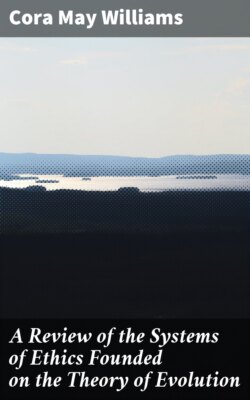Читать книгу A Review of the Systems of Ethics Founded on the Theory of Evolution - Cora May Williams - Страница 38
На сайте Литреса книга снята с продажи.
Of the Social Relation of the Individual
ОглавлениеWhen we assert the end of Action to be Pleasure, do we mean the pleasure of the individual, or universal happiness? "Good has been shown to follow immediately on the adaptation of an organism to circumstances; it is evident that external objects can affect it only in so far as they form part of these circumstances. Hence it follows that the pleasure and pain of others can come in only incidentally; from the fact that each man is not an isolated unit, but a member of society. But further, this social medium itself is, after all, nothing but a part of the individual affected by it; it is one division of that primary side of his nature, by which the other side, the emotional, the intellectual, the moral, is being continually moulded and fashioned; and even if we take the narrower meaning of self, the pleasures and pains of others cannot possibly affect a man's actions or emotions except in so far as they become a part of his. If man aims at pleasure merely by the physical law of action, that pleasure must evidently be ultimately his own; and whether it be or be not preceded by phenomena which he calls the pleasures and pains of others, is a question not of principle but of detail, just as the force of a pound weight is unaltered whether it be composed of lead or of feathers, or whether it act directly or through pulleys.
"The principle, therefore, is clear enough, that the happiness of others can have only an indirect influence upon the good of each individual. But it is equally clear that this direct influence must be of no mean extent, and that it is now our duty to trace its history." Here follows a scheme of the development of the state from the family, which last was necessitated by the helplessness of infancy, and from which arose the habit of human association. We have no evidence from history or science that mankind has not always existed in a state of society; there is no warrant for assuming an earlier condition of isolation. "Hence to the human race the earliest Good was inseparably bound up with what we now call the Family Virtues."[64] The state, thus originated, developed as a social organism, with ever greater integration, heterogeneity, and complexity of parts, and "the End or Good of each individual became largely modified by the extension of the medium to which his actions had to be adapted"; man became a member, not only of the family but of the state, and the conceptions of his nature and duty became wider, "so that at last the more perfectly each attains his own interest, and the more pleasure he gathers to his own store, the more certainly does he secure the universal happiness of mankind." If a man aims, as Spinoza remarks, at doing real good to himself, he will be sure to do most good to others.
